Is it possible to eat onions for gout and how can they help?
Onions are used as an anti-inflammatory, decongestant and analgesic in both folk and traditional medicine. Decoctions, infusions, and compresses are made from it. But is it possible to eat it if you have gout?
On the one hand, onions are a valuable food product, to some extent satisfy the body’s needs for vitamins and minerals, normalize blood circulation processes, and have a diuretic effect, which has a beneficial effect on the course of the disease. On the other hand, onions for gout have specific contraindications.
From the article you will learn how to properly use onions for gout and in what situations it is better to exclude it from the diet.
Features of the diet of patients with gout
Gout is a disease that affects a person's joints. It occurs in conditions of impaired purine metabolism, when uric acid is not excreted but accumulates in the blood. When a certain concentration is reached, crystals form in the synovial membrane of the joints. They provoke manifestations of gout: intense pain, swelling, redness, and impaired motor function.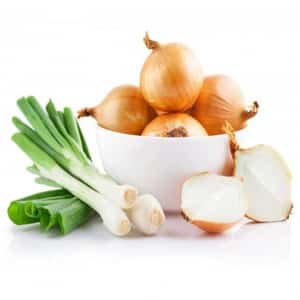
In order to normalize the processes of purine metabolism, reduce the level of uric acid and its salts, and reduce the acidity of urine, all patients are prescribed a diet.
The basis of therapeutic nutrition for gout is Table No. 6. This diet contains all the necessary micro- and macroelements, vitamins, minerals, but requires completely limiting foods with high levels of purines and oxalic acid.
If uric acid in the blood is elevated, exclude from the diet:
- fresh vegetables: cauliflower, spinach, radishes, sorrel, tomatoes, garlic, cucumbers, asparagus, mushrooms;
- pickled vegetables;
- fruits and berries: raspberries, cranberries, pineapples, kiwi, bananas;
- young greens;
- meat and poultry;
- meat/mushroom/fish broth;
- animal by-products (brains, kidneys, liver);
- smoked meat dishes;
- fish, canned fish, seafood;
- spicy snacks and spices, salt;
- cereals;
- fast carbohydrates: sugar, flour, confectionery.
The energy value of the daily diet is reduced to 1800 kcal for women, 2500-2700 kcal for men. Protein consumption is limited to 70 g, fat to 80 g, carbohydrates to 250 g. It is important that meals be split 5-6 times a day with plenty of fluids (up to 2 liters of free liquid) between meals.
The antipurine diet includes fasting days: vegetable, fruit, kefir, dairy, and curd days, once every 5-7 days. Unloading is especially important during periods of exacerbation of gout. At this time, any types of fish and meat are contraindicated. Only fermented milk products, vegetable soups, fruit infusions and herbal tea are allowed.
Important. Fasting is strictly contraindicated, since insufficient supply of nutrients sharply increases the concentration of uric acid in the blood and provokes an exacerbation of gout.
At the same time, the diet is expanded to include alkalizing products.
The menu includes:
- milk;
- vegetables - cabbage, pumpkin, seaweed, potato, zucchini, beets;
- fruits - strawberries, gooseberries, citrus fruits, apples, black and red currants;
- dried fruits and nuts;
- eggs;
- cereals and pasta;
- dairy and fermented milk products;
- vegetarian borscht, vegetable soups;
- yeast-free baked goods, rye bread.
As for drinks, alkaline mineral water is especially useful, but you can drink natural juices, drinks based on them, and black tea with milk. Among sweets, marmalade, honey, jam, marshmallows, and marshmallows are allowed.
Heat treatment matters. As for fish, poultry and meat, they must be boiled first. Half of the norm of purines during the cooking process goes into the broth, which can then not be consumed by patients with gout.
Meat and fish are eaten boiled, stewed, baked. They are included in the diet twice a week. Portions should be small: meat - 150 g, fish - 170-200 g.
Attention! The duration of the diet depends on the disease and the characteristics of its course. Therapeutic nutrition is followed for several months or permanently. When creating a menu, pay attention to the presence of concomitant diseases: diabetes, obesity, hypertension, urolithiasis.
Is it possible to eat onions if you have gout?
When a diet is prescribed to reduce uric acid levels, patients have many questions about which foods are allowed, which are partially or completely limited, and in what form and quantity to consume certain foods. Many patients are interested in whether it is possible to eat onions if they have gout. Let's look at this issue in as much detail as possible.
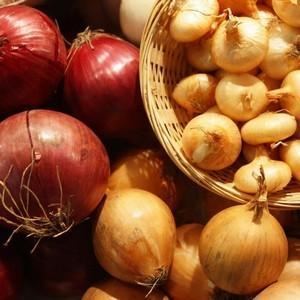 Onions are an important vegetable crop, one of the main ones in the diet. The bulbs and leaves are eaten raw or fried, used as a seasoning for salads, mushrooms, vegetable and meat dishes, and as a flavoring additive for soups, gravies, and minced meat.
Onions are an important vegetable crop, one of the main ones in the diet. The bulbs and leaves are eaten raw or fried, used as a seasoning for salads, mushrooms, vegetable and meat dishes, and as a flavoring additive for soups, gravies, and minced meat.
Doctors allow the use of onions for gout, but selectively.The onion family includes several varieties of products with different chemical composition and nutritional properties. They have different effects on purine metabolism.
In the diet for gout, it is recommended to limit fresh onions and give preference to green onions, leeks, and shallots.
Green
Onion feathers, like other parts of the plant, contain a minimal amount of purine bases. It would seem that this is enough to include the product on the approved list. However, there is a reason why green onions should be used carefully and in limited quantities for gout.
It contains compounds of acetylsalicylic acid, which limit the ability of the kidneys to excrete uric acid, which can aggravate the course of gout.
Bulb
The bulbs contain organic substances and amino acids, which irritate the gastrointestinal mucosa, increase pain, and disrupt kidney function.
However, in moderation, onions will do more good than harm. This is a powerful antioxidant that reduces blood cholesterol and regulates hemoglobin levels. Onions exhibit their beneficial properties when used externally: they neutralize swelling, inhibit inflammation, and relieve pain.
This is interesting:
Is it possible to eat beets if you have gout: let’s look at the pros and cons.
Leek
Leeks are distinguished by a high content of calcium salts, due to which they exhibit a pronounced diuretic effect: they increase the flow of urine, flush out waste, toxins, and salt concretions from the body, thereby preventing the deposition of uric acid in the joints.
In addition, it is gentle on the stomach and does not irritate the mucous membrane, therefore it is recommended for people suffering from gout.
Attention! In the acute stage, leeks, like any other type of onion, are contraindicated.
In what form can and cannot be used?
To protect the gastrointestinal tract from negative mechanical, physical and chemical influences, onions must be processed: boiled, steamed, stewed or baked. Green onions and leeks are allowed to be consumed fresh, but only in limited quantities.
Fried
Fried onions in vegetable oil are added to salads, mushrooms, vegetable and meat dishes, side dishes, as an additive to sauces, minced meat, and gravies. Its use should be kept to a minimum.
Fresh
Fresh leeks, shallots or green onions are good to eat. Unlike onion, they have a softer and more pleasant taste. Fresh onions perfectly complement sausages, cheeses, cottage cheese, bread, meat, salads from fresh and canned vegetables.
In the absence of diseases of the digestive system, it can be consumed every day, but in small quantities.
Boiled
This is the most optimal way to cook onions. Cooking will preserve the vitamin and mineral composition almost unchanged. At the same time, the vegetable loses substances that irritate the gastrointestinal mucosa and prevent the excretion of uric acid from the body.
Boiled onions are usually used in soups and borscht; boiled and stewed onions are used in vegetable and meat stews.
Rules and regulations for use
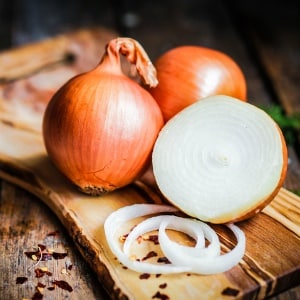 The most important rule for eating onions, regardless of the type and method of cooking, is compliance.
The most important rule for eating onions, regardless of the type and method of cooking, is compliance.
Prevention of exacerbation of gout is:
- Special culinary processing of onions.Provides mechanical sparing of the digestive system, while the benefits to the body do not decrease.
- Compliance with the principle of fractional nutrition and regimen. Large volumes of food negatively affect the secretory and motor functions of the stomach.
- Eating warm food at the optimal temperature is 37-40°C.
- Chew thoroughly. In this case, the components are absorbed more fully.
Beneficial properties of onions for gout
The beneficial properties of onions directly depend on the product itself and its proper heat treatment. A properly grown vegetable without the use of nitrates is rich in proteins, vitamins B, A, E, H, nicotinic and ascorbic acids, silicon, phosphorus, calcium, potassium, manganese, copper, zinc.
One of the most important effects of onions is to cleanse the liver, blood, and intestines of various harmful substances. The large amount of fiber in the plant removes waste and toxins from the body, eliminates bad cholesterol, and normalizes the water-salt balance. In addition, onions prevent the formation of salt deposits in the kidneys and gall bladder, stabilize blood pressure, and prevent the development of heart and vascular diseases.
For gout, onions have a pronounced anti-inflammatory, antimicrobial, diuretic and analgesic effect. With its regular use, you can achieve stable remission, alleviate the severity of symptoms, and increase the range of motion in the affected joint. B vitamins, for which onions are valued, together with ascorbic acid, improve the condition of small capillaries and vascular walls, increase their strength and elasticity, and stimulate the processes of hematopoiesis and blood circulation.
For reference. Vitamin E acts as a powerful antioxidant, prevents the appearance of degenerative changes in skeletal muscles, reduces capillary permeability, and strengthens the immune system.
Therapeutic recipes with onions for gout
To treat gout, traditional medicine suggests using compresses externally, and decoctions and infusions internally. Onions will be especially useful when applied topically.
The active components penetrate the skin, reaching the lesion, providing anti-inflammatory, anti-edematous and analgesic effects. Such products do not cause allergic or local toxic reactions.
Tincture
It is forbidden to use the tincture for people with alcohol addiction and children.
Prepare onion tincture as follows: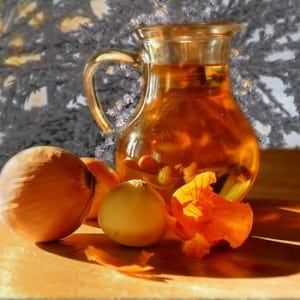
- Grind 300 g of onion without peel in a blender or using a grater.
- In a sealed glass container, mix 100 g of honey and 500 ml of white wine, add onion pulp, mix everything.
- Infuse with the lid closed in a warm place for 14 days, shaking the mixture occasionally.
- Take 2 tsp of strained tincture. before meals 3 times a day.
Decoction
The benefits of onion decoction for gout are reducing inflammation and swelling, restoring joint mobility. A remedy is prepared from onions. To do this, you will need 3 medium-sized onions and 1 liter of drinking water.
Recipe:
- Rinse the onion well without removing the peel, add 1 liter of water.
- Once boiling, simmer over low heat until the onions are soft.
- Adults take the strained decoction three times a day, 200 ml, half an hour before meals.
The course of treatment should be carried out until the symptoms disappear completely, but not longer than 14 days, unless otherwise specified by the attending physician.
Advice. To remove bad breath, just chew coffee beans or coriander seeds.
Infusion
Onions are used to prepare the infusion.
Recipe:
- Peel one medium onion and finely chop.
- Place the onion in an airtight glass container and pour in 1 liter of boiling water. Infuse, covered, in a warm place for 6-8 hours, and then strain.
- Take 200 ml infusion once a day.
The course of treatment is 7-10 days. If necessary, repeat the procedure after a break.
Compresses
Compresses are used to treat inflammation. They have a warming effect, dilate blood vessels, increase blood flow to the lesion, which helps eliminate swelling and resolve the infiltrate.
The composition contains other ingredients - butter and beeswax, which enhance the effect of onions. Thus, the oil improves blood circulation, inhibits inflammatory processes, and beeswax deeply warms the skin, reduces the intensity of pain, and suppresses the growth of pathogenic microorganisms.
Onion compress recipe: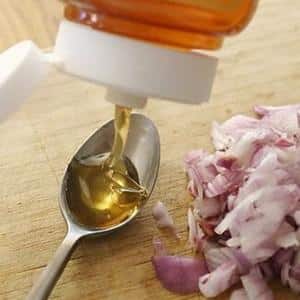
- Peel the onions and chop them using a blender or grater.
- Pour 2 tbsp into a dry container. l. onion pulp, the same amount of beeswax and soft butter, mix.
- Apply the mixture to a cloth or bandage folded in several layers. Apply to the skin, line the top with oilcloth or wax paper, attach to the body with a few turns of bandage, and wrap with a warm scarf.
- Ideally, perform the procedure at night before bed, when movements are limited. In the morning, remove the compress, rinse the skin with water at room temperature, and wipe dry.
- If necessary, apply a warming or anti-inflammatory ointment.
Possible harm and contraindications
Eating large portions of green and onions has an adverse effect on health:
- have an irritating effect on the mucous membranes of the gastrointestinal tract;
- increase abdominal pain;
- provoke increased gas formation;
- increase blood pressure;
- stimulate attacks of shortness of breath and severe coughing in people with bronchial asthma.
To prevent possible adverse reactions, before using onions for gout, consult a specialist and inform him about existing diseases.
Onions for gout are contraindicated if you have:
- allergies to the product;
- hypertension;
- inflammatory diseases of the stomach and duodenum;
- cholelithiasis;
- pyelonephritis;
- anemia;
- epileptic seizures.
External use of onions for gout is complicated by skin diseases and wounds at the site of application.
Read also:
Is it possible to eat rice if you have gout: the benefits and possible harm of the product.
Is it possible to eat eggplant if you have gout?
Is it possible to eat melon if you have gout and how is it useful?
Conclusion
The question of whether you can eat onions if you have gout should first be asked to your doctor. After all, this is a product in which benefits and harm go side by side, and sometimes side effects prevail over positive effects.
In order to avoid complications and not cause harm to health, it is advisable to select a recipe and regimen for treating gout with onions on an individual basis with mandatory consultation with a specialist. And remember that self-medication can be life-threatening.